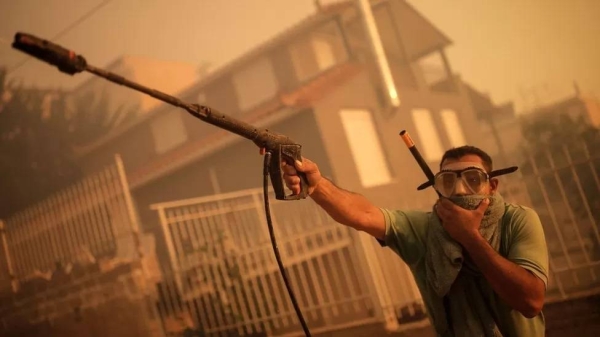
With temperatures rising on both the weather and security fronts across the region, Iraqs freshman electricity minister is warning that politicizing his countrys power sector could have ripple effects around the world.
"Electricity is a national security issue," Luay al-Khateeb told AFP in a wide-ranging interview at the ministrys headquarters in Baghdad.
"In the end, any political, economic or security crisis in Iraq will affect the whole region -- and the global economy will be open to threat."
"Were urging for this file not to be politicized."
Khateeb, a 51-year-old energy expert, was appointed minister in October with a mandate to revamp Iraqs grid, which was already ailing before it was further crippled by the ISIS group.
But he faces a pair of formidable political challenges to a typically dry, technical portfolio: the threat of renewed protests and escalating US pressure on energy-supplier Iran.
Demonstrations erupted in 2018 across Iraq against poor services, including the measly few hours of state-provided electricity per day.
This summer will be a de facto referendum on the government´s progress.
Khateeb, optimistic, said his ministry had revived out-of-service stations, fixed transmission lines, and brought temporary generators to battered areas including Mosul that ISIS held in the north.
"On October 25, the week I took office, electricity generation sat at between 9.5 to 10 GW. It is now at 15 GW," Khateeb said.
Most Iraqi provinces, he added, "will receive no less than 20 hours of electricity per day. This, to be honest, is a level of production the country hasnt seen in years."
In the medium term, the ministry is developing solar power, gas-capturing capabilities, and energy deals with neighbors.
It signed contracts worth 700 million euro ($785 million) with Germanys Siemens last month, amid expectations of similar deals with American rival General Electric.
Around a third of Iraqs electricity relies on Iran, through 28 million cubic meters (990 cubic feet) of gas piped in to feed stations or the direct import of up to 1,300 megawatts of Iranian-produced electricity.
When Washington reimposed sanctions on Iran last year, it granted Iraq temporary exemptions until late June.
Khateeb declined to say what would happen if the waiver was not again extended.
"Im not in the business of making predictions, but what I ask for from world powers is a little reasonableness so we can live in peace on this planet," he told AFP.
Tensions have ramped up between Washington and Tehran, with Baghdad often caught in the middle.
Iraqi government sources say the US is pressuring Baghdad to partner with American companies including General Electric, ExxonMobil and Honeywell as it weans off Iranian energy.
Khateeb acknowledged foreign embassies were pushing for their interests in Iraqs power sector, but said Baghdad would try to steer clear of the politics.
"The truth is we dont want to be a scapegoat in conflicts that will negatively affect regional security, and in turn the global economy," he said.
Besides the ticking clocks of the Iraqi street and geopolitical tensions, Khateeb admitted pressure from within the government itself.
He said he had "inherited a bureaucracy" and was often asked for favors or employment opportunities.
Asked whether he, like Prime Minister Adel Abdul Mahdi, kept his resignation letter close at hand, Khateeb sounded determined.
"One needs to have a thick skin," he said.
"Either I focus on the politicians, or I focus on the work."












